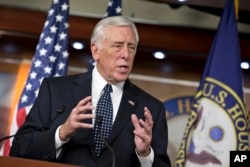House Speaker Paul Ryan said a strong sanctions bill against Russia would come up for a vote soon, despite procedural delays and claims of partisan clashes on Capitol Hill.
"I'm a Russia hawk. I believe in strong, bold Russian sanctions," Ryan told reporters Wednesday morning. The House Speaker said the bill had been delayed by procedural concerns, including technical changes to insure the Senate-passed version of the bill complied with the U.S. Constitution.
But House Democrats announced they would introduce their own version of the bill Wednesday, in an attempt to overcome delays to the Senate-passed version that they blame on the Trump White House.
"I don't think there's any doubt that the White House does not want this piece of legislation passed," House Minority Whip Steny Hoyer told reporters Wednesday morning.
"There has been some assertion that we are holding up the bill," Hoyer said. "The majority leader can put the bill on the floor as early as 12:01 p.m. today. He has that authority. I would urge him to do so. And if he puts the Senate bill on the floor, we will support it."
The bill has been awaiting a House vote for almost a month, since the Senate passed it 98-2. The sanctions debate comes amid intense focus on Russia interference into the 2016 U.S. presidential election and investigations into the nature of the Trump campaign's relationships with Russian contacts.
"There's no question that Congress needs to respond," Senator Ben Cardin, a Democrat from Maryland, told reporters Tuesday. "I have contacted House members, urged them to take up and pass this bill quickly. Let the House act, they need to act now."
The sanctions build on executive actions taken by then-President Barack Obama after the Russian annexation of Crimea, and last year in response to confirmation by the U.S. intelligence community of Russian election interference.
"These sanctions would significantly hamper Russia's ability to influence European economies through the energy sector, which has been the primary tool [that] the Russians — through [natural gas producer] Gazprom, through other means of export of gas and oil — have sought to gain a foothold in European economies," Dr. Alina Polyakova, director of research for Europe and Eurasia at the Atlantic Council, told VOA.
Speaker Ryan said the House looked forward to moving on the bill to limit Russian power.
"There are some policy issues with respect to making sure that we don't actually inadvertently help Russian oligarchs and oil firms," Ryan said of some of the changes needed. "But aside from those issues, we want to get this done."
White House concerns
But concerns about other provisions could continue to hold up the bill. Earlier this week, the White House lobbied Capitol Hill for changes to language in the bill that would allow any member of Congress to express disapproval if the president eased those sanctions.
"Our concern is that the legislation, we believe, sets an unusual precedent of delegating foreign policy to 535 members of Congress by not including certain national security waivers that have always been consistently part of sanctions bills in the past," White House legislative director Marc Short told reporters Monday.
Hoyer said he had proposed a compromise to Republican leadership Tuesday night that would allow minority leadership to express those concerns.
Hoyer and other House Democrats argue the sanctions are a needed check on an administration that is too close to Russian President Vladimir Putin. Stricter controls on executive power, however, could limit the United States' diplomatic flexibility.
"Once these sanctions are in place, it's a pretty inflexible tool and if Russia were to comply with some of the Minsk Agreement provisions, it's not that easy to begin lifting the sanctions," said Dr. Angela Stent, director of Georgetown University's Center for Eurasian, Russian and Eastern European Studies. "I think the president has to have some flexibility here just in case there is reason to respond positively to things Russia does."
If the House passes the bill and sends it to the president's desk, a veto is unlikely. The Senate version of the bill packages the Russia sanctions with sanctions against Iran that are supported by the administration. Additionally, the Senate is expected to have enough votes to override a presidential veto, making the bill law.






